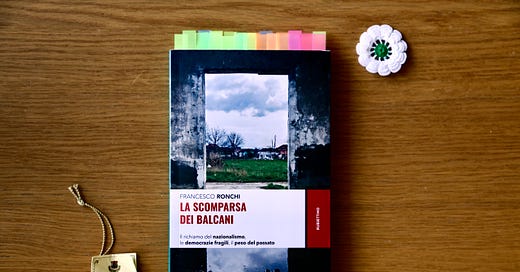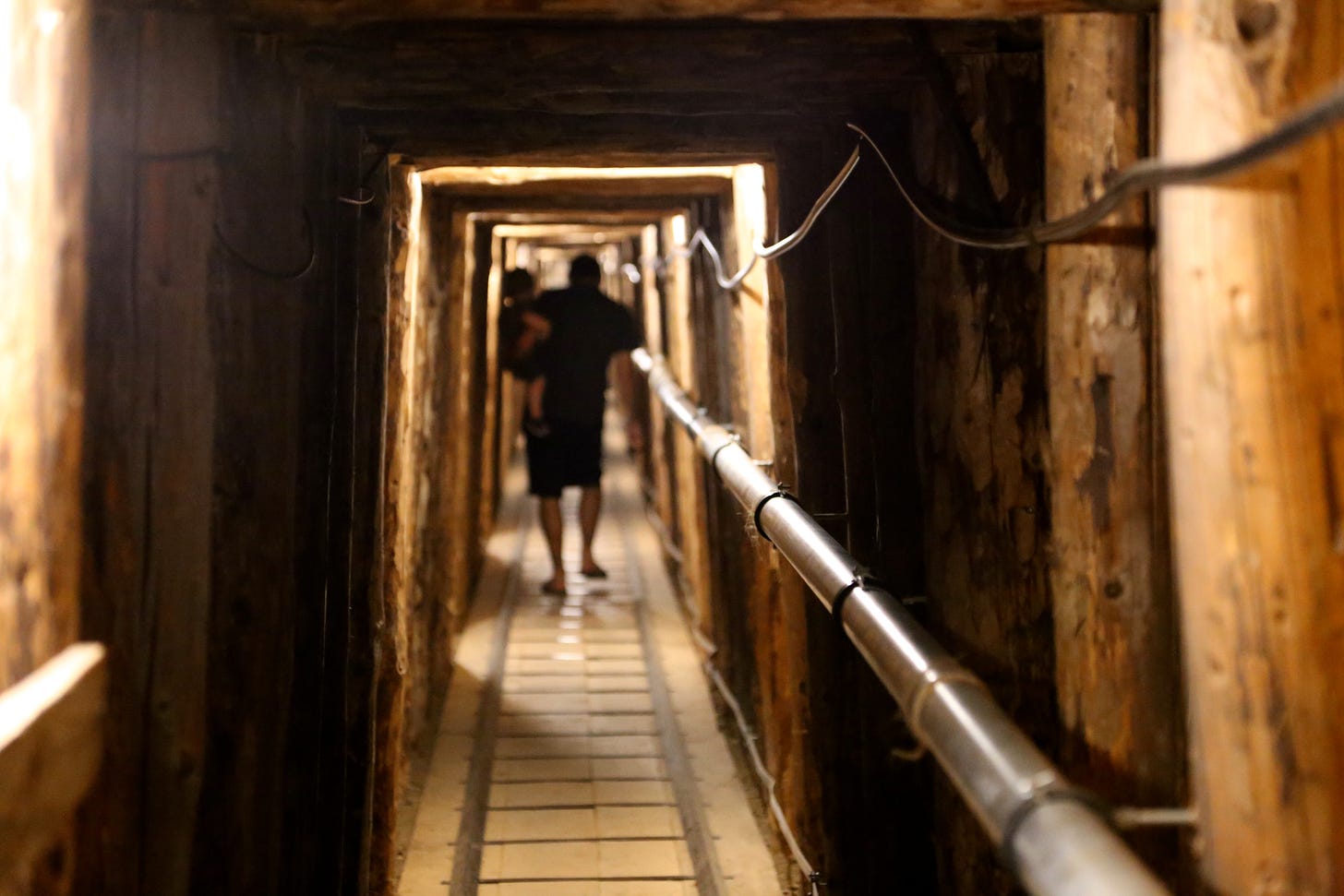S4E12. The Balkans are disappearing
Interview with Francesco Ronchi, author of an essay focused on the risk of losing the region. We must care about what is happening with ethno-nationalism, demographic crisis and the 'Serbian question'
Dear reader,
welcome back to BarBalkans, the newsletter with blurred boundaries.
There is a black hole in the heart of Europe. A whole region - that belongs entirely to the European continent - has been erased from the maps of the European Union.
Ethno-nationalism, peace without peacemaking, demographic crisis, the ‘Serbian question’, Russian and Chinese destabilization, authoritarianism, fragility of democratic systems, risk of disappointment in the process of EU enlargement.
This is how the complex reality of problems in the Balkan region is summarized by Francesco Ronchi - Administrator for Democracy Support at European Parliament and Adjunct Professor of International and Public Affairs at the Columbia University - in his latest book La scomparsa dei Balcani (“The disappearance of the Balkans”).
At the presentation of the essay at Piolalibri in Brussels (on January 22), Ronchi talked with BarBalkans, along with MEP and Chair of the Delegation to the EU-Serbia Stabilization and Association Parliamentary Committee, Alessandra Moretti.
With the aim of trying to answer the most pressing questions about the risks to the whole of Europe if the Balkans “disappear”, but also about the need to fill this black hole in the heart of the European continent.
The disappearance of the Balkans
How did you become aware of the “disappearance” of the Balkans? And what are the reasons behind this issue?
«This book was born out of a sense of urgency, considering the situation in the Balkans. Europe risks losing the region, which will move towards nationalism and authoritarianism.
We are seeing a resurgence of nationalism especially in Bosnia and Herzegovina - threatened by ethnic Serbs’ secessionism - and in Serbia, where institutions and parts of society still dream of regaining Kosovo.
Moreover, the new burst of violence across the region is quite worrying. In Serbia, against political opponents, while the specter of armed conflict looms over the region again. Serbian troupes were deployed on the border with Kosovo in December 2022, and Serbian paramilitary militias were intercepted in Northern Kosovo in September 2023.
This is connected with a culture of violence and hatred, that brought to question Srebrenica genocide and to glorify war criminals in Republika Srpska.
This atmosphere is very dangerous. And I sincerely do not understand how the Balkans have disappeared from European public debate. This book is a contribution to bringing the Balkans back at the center of discussions».
Unsolved nationalism
Nationalism in the region is characterized by a continuous return to the past and, most of all, is linked to ethnicity. Why this rhetoric is still based on ‘ethnos’?
«Nationalist hatred does not concern only the Balkans. For example, Italy has also experienced ethnic and ideological hatred.
I chose to start my book presentation tour from Northern Italy, where I met the last witnesses of the violence that took place in the long post-World War II period. Almost 80 years after the end of that season of violence, there is still some hatred among family members and witnesses.
However, unlike in the Balkans, Italian postwar politicians were able to understand that it was time to stop the hatred. On the other hand, the trauma of the past is systematically amplified by Balkan politicians.
The same protagonists and perpetrators of the acts of ethnic hatred are still in politics and proudly claim their past. The persistence of nationalism in the Balkans is a compulsion to repeat the past fueled by politics».
Read also: S3E9. The legend of fraternal Spomeniks
After the bloody Nineties, the peace in the Balkans has not been based on peacemaking. Despite the war is not breaking out again, there is a continuous threat of renewed conflict. What are the implications for the region and for the rest of Europe?
«If war does not break out in the Balkans, it is not because of a lack of ideological will, but rather because of exhaustion. The region is impoverished, demographically drained, and lacks a hegemonic army as the Yugoslav Army (monopolized by the Serbs) in the Nineties.
In short, peace lasts more because of fatigue than adherence. This reluctance to embrace peace as a conscious choice has preserved the spellbinding power of war, the threat that continues undermine politics and society.
The new international framework and the outbreak of war in Ukraine have made the situation in the region even more problematic».
The ‘Serbian question’
The heart of this issue lies in the ‘Serbian question’, a threat to stability of the entire region. What is this common root?
«The core of the ‘Serbian question’ is the inability of important parts of Serbian politics and society to deal with the deadly legacy of the Nineties.
What is missing in Serbia is a collective critical consciousness that can look deeply into the past. Not removing, but rather searching for the roots of its guilt: nationalism and the cult of violence.
The nationalist fascination and the return of violence, along with disruptive corruption, are the ingredients of a new authoritarian model. Such as in Serbia and in Republika Srpska, but it also involves Montenegro and Northern Kosovo, threatening the stability of the region».
Russia and China shows two different strategies of influencing the region, but they offer the same support to the ‘Serbian world’. How worrying is their presence in the Balkans, together with a possible citizens’ disillusion with the European Union?
«Russia is acting in the region as a troublemaker and clearly aims to destabilize the political balance by supporting ethnic Serbs in Kosovo and Bosnia. China shows a more discreet strategy, providing unconditional funding and security technologies as well as low-cost products.
However, in this framework what is more worrying is European weakness. The European Union is the major trading partner and the cultural and geographic point of reference for the Balkans. Yet, our political influence is not at the same level as our economic and cultural power.
We need a new approach that focuses on political dynamics and challenges authoritarianism and nationalism in the region, building a stronger relationship with the political and social forces that want a real change».
Read also: S4E9. This is a tipping point
Pit stop. Sittin’ at the BarBalkans
We have reached the end of this piece of road.
Today our bar, the BarBalkans, hosts the author of La scomparsa dei Balcani. Thanks to his many trips to the region, Ronchi has gathered several recommendations on products not to be missed and which are not disappearing at all.
«I recommend drinking a Montenegrin red wine, Vranac. Its red fruits’ taste reminds the Montenegrin mountains and its sweetness come from the warm Mediterranean winds of that region.
I particularly recommend Vranac by Plantaže Winery, a large State-owned company funded during Yugoslav times. Its hangars were bombed in 1999 by NATO and recently its management was hit by a corruption scandal. A truly Balkan story.
When I travel to Podgorica, in Montenegro, I always stop at Pod Vol, a popular and traditional restaurant where you can eat good meat and drink Vranac wine.
My book was conceived and partly written on Pod Vol’s tables».
Read also: Plantaže. A wine cellar in a Yugoslav bunker
Let’s continue BarBalkans journey. We will meet again in two weeks, for the 13th stop of this season.
A big hug and have a good journey!
If you have a proposal for a Balkan-themed article, interview or report, please send it to redazione@barbalcani.eu. External original contributions will be published in the Open bar section.
The support of readers who every day gives strength to this project - reading and sharing our articles - is also essential to keep BarBalkans newsletter free for everyone.
Behind every original product comes an investment of time, energy and dedication. With your support BarBalkans will be able to elaborate new ideas, interviews and collaborations.
Every second Wednesday of the month you will receive a monthly article-podcast on the Yugoslav Wars, to find out what was happening in the Balkans - right in that month - 30 years ago.
You can listen to the preview of The Yugoslav Wars every month on Spreaker and Spotify.
If you no longer want to receive all BarBalkans newsletters (the biweekly one in English and Italian, Open Bar external contributions, the monthly podcast The Yugoslav Wars for subscribers), you can manage your preferences through Account settings.
There is no need to unsubscribe from all the newsletters, if you think you are receiving too many emails from BarBalkans. Just select the products you prefer!








